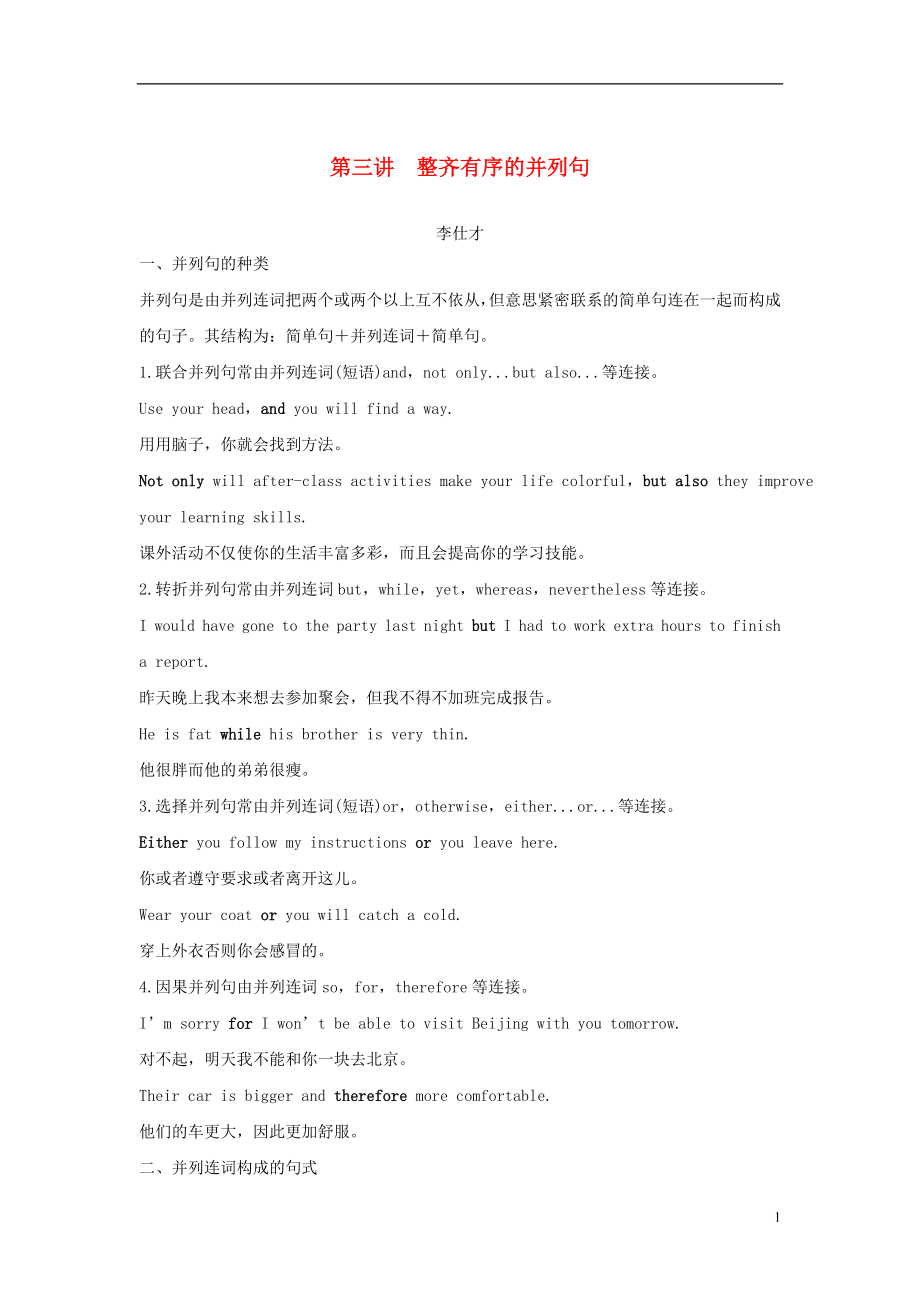《江蘇省2019高考英語(yǔ) 第三部分 寫(xiě)作層級(jí)訓(xùn)練 第一步 循序漸進(jìn)提升寫(xiě)作技能 第三講 整齊有序的并列句(講解)》由會(huì)員分享���,可在線閱讀���,更多相關(guān)《江蘇省2019高考英語(yǔ) 第三部分 寫(xiě)作層級(jí)訓(xùn)練 第一步 循序漸進(jìn)提升寫(xiě)作技能 第三講 整齊有序的并列句(講解)(4頁(yè)珍藏版)》請(qǐng)?jiān)谘b配圖網(wǎng)上搜索。
1�����、
第三講 整齊有序的并列句
李仕才
一���、并列句的種類
并列句是由并列連詞把兩個(gè)或兩個(gè)以上互不依從����,但意思緊密聯(lián)系的簡(jiǎn)單句連在一起而構(gòu)成的句子���。其結(jié)構(gòu)為:簡(jiǎn)單句+并列連詞+簡(jiǎn)單句���。
1.聯(lián)合并列句常由并列連詞(短語(yǔ))and,not only...but also...等連接����。
Use your head,and you will find a way.
用用腦子���,你就會(huì)找到方法�����。
Not only will after-class activities make your life colorful�����,but also they improve your learning skil
2���、ls.
課外活動(dòng)不僅使你的生活豐富多彩���,而且會(huì)提高你的學(xué)習(xí)技能。
2.轉(zhuǎn)折并列句常由并列連詞but����,while,yet����,whereas,nevertheless等連接����。
I would have gone to the party last night but I had to work extra hours to finish a report.
昨天晚上我本來(lái)想去參加聚會(huì),但我不得不加班完成報(bào)告���。
He is fat while his brother is very thin.
他很胖而他的弟弟很瘦�����。
3.選擇并列句常由并列連詞(短語(yǔ))or�����,otherwise����,eithe
3�����、r...or...等連接���。
Either you follow my instructions or you leave here.
你或者遵守要求或者離開(kāi)這兒����。
Wear your coat or you will catch a cold.
穿上外衣否則你會(huì)感冒的�����。
4.因果并列句由并列連詞so�����,for,therefore等連接�����。
I’m sorry for I won’t be able to visit Beijing with you tomorrow.
對(duì)不起�����,明天我不能和你一塊去北京����。
Their car is bigger and therefore more
4、comfortable.
他們的車更大���,因此更加舒服�����。
二�����、并列連詞構(gòu)成的句式
1.祈使句/名詞詞組+and/or/otherwise+陳述句
(1)祈使句+and+陳述句(祈使句相當(dāng)于一個(gè)條件狀語(yǔ)從句���,and后面的句子相當(dāng)于一個(gè)表示結(jié)果的主句)
Work hard and you will succeed.(= If you work hard���,you will succeed.)努力學(xué)習(xí),你就會(huì)成功���。
(2)名詞詞組+and+陳述句(名詞詞組相當(dāng)于一個(gè)條件狀語(yǔ)從句���,其中常含有more����,another等詞)
Another try,and you’ll achieve succ
5����、ess.
再試一次,你就會(huì)取得成功�����。
(3)祈使句+or/otherwise+陳述句
Seize the chance���,or/otherwise you’ll regret.
抓住這次機(jī)會(huì)����,否則你會(huì)后悔的。
(4)名詞詞組+or/otherwise+陳述句
More healthy food���,or/otherwise you’ll break down sooner or later.
多吃健康食品�����,不然你的身體遲早會(huì)垮掉�����。
2....when...……這時(shí)……
(1)sb was/were doing sth when...某人正在做某事����,這時(shí)……
Last Monday
6����、,I was walking in the street when I suddenly saw an old man fall off his bicycle.
上周一�����,我正在街上散步����,這時(shí)突然看到一位老人從自行車上摔下來(lái)了����。
(2)sb was/were about to do sth when...某人正要做某事����,這時(shí)……
I was about to give up when my best friend encouraged me to go on.
我正要放棄,這時(shí)我最好的朋友鼓勵(lì)我繼續(xù)下去���。
(3)sb had just done sth when...某人剛做完某事�����,
7、這時(shí)……
I had just finished sweeping the floor when the telephone rang.
我剛剛拖完地���,這時(shí)電話鈴響了���。
[跟 蹤 訓(xùn) 練]
Ⅰ.用適當(dāng)?shù)牟⒘羞B詞填空
1.He couldn’t know the truth about me, or/otherwise__he wouldn’t treat me like this.
2.The bell is ringing __and__the lesson is over.
3.He was ill, but/yet he kept on working.
4.He
8、doesn’t talk much, but/yet he thinks a lot.
5.__Either__you leave here at once __or__I will call the police.
6.It must have rained last night, for__the ground is still wet.
7.Jane was dressed in green while/whereas Mary was dressed in blue.
8.The child was sick; he, therefore,__didn’t go to
9����、school.
9.By doing so�����,I can not__only__share good ideas with others __but__also__learn to express myself clearly.
10.As a retired ear doctor����,I heartily recommend TV Ears to people with normal hearing __as__well__as those with hearing loss.
Ⅱ.把下列簡(jiǎn)單句連接成并列句
1.He gave us a lot of advice. He helped
10���、us to study English����,too.
He__not__only__gave__us__a__lot__of__advice���,but__also__helped__us__to__study__English.
2.He is a famous singer.He has written some interesting books.
Not__only__is__he__a__famous__singer����,but__also__he__has__written__some__interesting__books.
3.You must go early.If not���,yo
11���、u will miss the first bus to school.
__You__must__go__early,otherwise/or__you__will__miss__the__first__bus__to__school.
4.I like reading stories in my spare time.My brother likes playing football.
I__like__reading__stories__in__my__spare__time__while__my__brother__likes__playing__football.
5.Tom
12����、 is coming to my office���,or his brothers wait for me after work.
Either__Tom__is__coming__to__my__office__or__his__brothers__wait__for__me__after__work.
Ⅲ.翻譯句子
1.湯姆很窮,而他的弟弟卻發(fā)了財(cái)����。
Tom was poor while__his__brother__became__very__rich.
2.太陽(yáng)從東方升起,從西邊落下����。
The sun rises in the east and__it__sets__in__the__west.
3.要么你離開(kāi)這所房子,不然我叫警察�����。
Either__you__leave__the__house__or I’ll call the police.
4.他許諾了�����,但是沒(méi)有遵守諾言����。
He made a promise __but__he__didn’t__keep__it.
5.動(dòng)動(dòng)腦筋����,你會(huì)找到一種方法����。
Use__your__head����,and you’ll find a way.
4
 江蘇省2019高考英語(yǔ) 第三部分 寫(xiě)作層級(jí)訓(xùn)練 第一步 循序漸進(jìn)提升寫(xiě)作技能 第三講 整齊有序的并列句(講解)
江蘇省2019高考英語(yǔ) 第三部分 寫(xiě)作層級(jí)訓(xùn)練 第一步 循序漸進(jìn)提升寫(xiě)作技能 第三講 整齊有序的并列句(講解)

